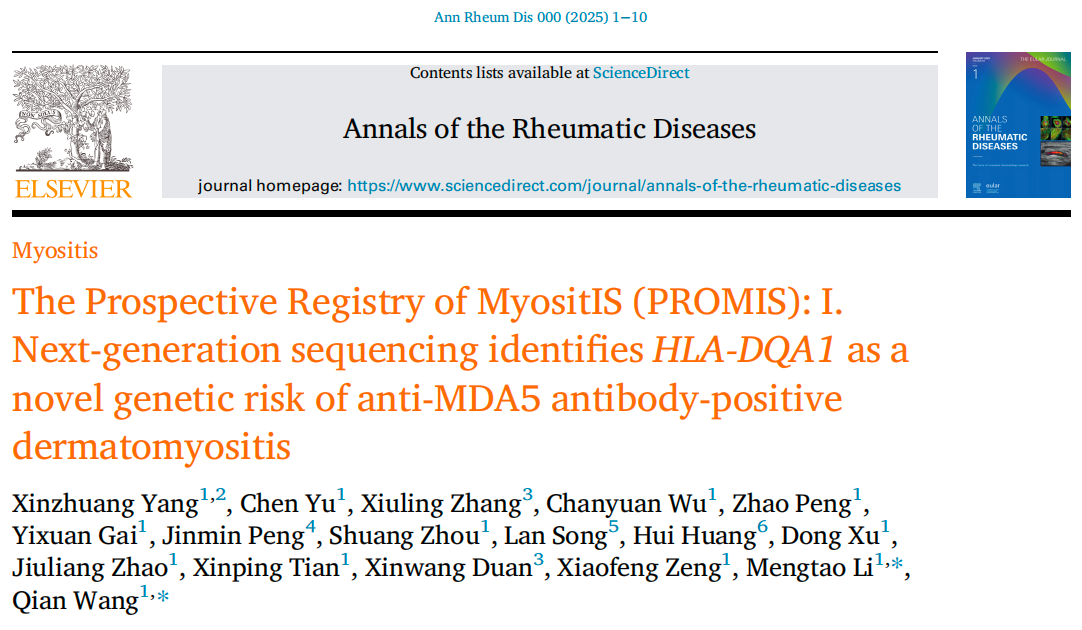Recently, a genomic study on anti-MDA5 antibody-positive dermatomyositis completed through collaboration between the Department of Rheumatology at PUMCH (led by Director Li Mengtao and Deputy Director Wang Qian) and the Second Affiliated Hospital of Nanchang University was published in Annals of the Rheumatic Diseases, a leading journal in rheumatology. For the first time, this study identified HLA-DQA1*06:01 as a susceptibility genotype for the development of anti-MDA5 antibody-positive dermatomyositis. The research revealed that carrying this genetic variant is associated with poor prognosis, providing new perspectives for risk stratification and management of poor prognosis in patients. This research was supported by National High Level Hospital Clinical Research Funding, among others.

Antimelanoma differentiation-associated gene 5 antibody-positive dermatomyositis (anti-MDA5+ DM) is the most severe subtype among idiopathic inflammatory myopathies, with its most prominent characteristic being the occurrence of rapidly progressive interstitial lung disease (RPILD) in approximately 50% of patients. Patients experience rapid disease deterioration within weeks of onset, show poor response to conventional corticosteroid and various immunosuppressive therapies, and are prone to complications including severe infections and pneumomediastinum. Once respiratory failure occurs, mortality rates reach as high as 80%. Multiple studies indicate that genetic factors, viral infections, and immune abnormalities may all play crucial roles in the pathogenesis of this disease, though the underlying mechanisms remain incompletely elucidated. Human leukocyte antigen (HLA) molecules participate in antigen presentation and may play an important role in genetic susceptibility to anti-MDA5+ DM. Previous studies have reported clinical risk factors for poor prognosis in anti-MDA5+ DM, but the role of genetic factors in determining prognosis has been rarely investigated.
The Rheumatology team at PUMCH, leveraging the platform of the National Clinical Research Center for Dermatologic and Immunologic Diseases, established a Chinese multicenter prospective clinical cohort for inflammatory myopathies and conducted research on genetic variants in major histocompatibility complex (MHC) and non-MHC regions and their association with genetic susceptibility to anti-MDA5+ DM. The study enrolled 276 anti-MDA5+ DM patients, with the control groups including 127 anti-MDA5⁻ DM patients, 1,468 patients with non-DM rheumatic diseases, and 1,027 healthy controls. The team led by Director Zhu Yicheng from the Department of Neurology provided sequencing data for the healthy control group. Whole-exome sequencing identified 129,467 genetic variants. Association analysis results demonstrated that HLA-DQA1*06:01 was significantly associated with the development of anti-MDA5+ DM and indicated poor prognostic outcomes.
Leveraging the world's largest genetic cohort of anti-MDA5+ DM assembled to date, this research provided important genetic insights into the pathogenesis of this clinically rare but high-risk rheumatic disease. The findings provide new insights for predicting the risk of RPILD development and even death in these patients and contribute to the development of more precise assessment and individualized treatment strategies.
Written by and picture courtesy of the Department of Rheumatology
